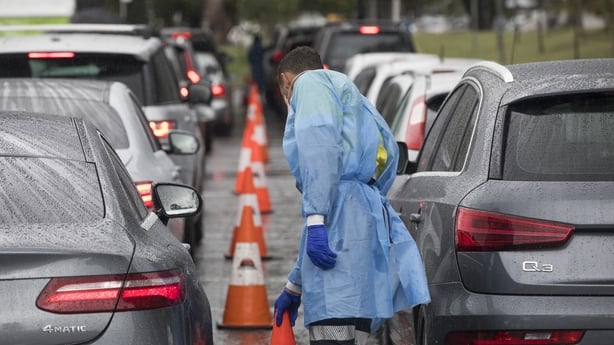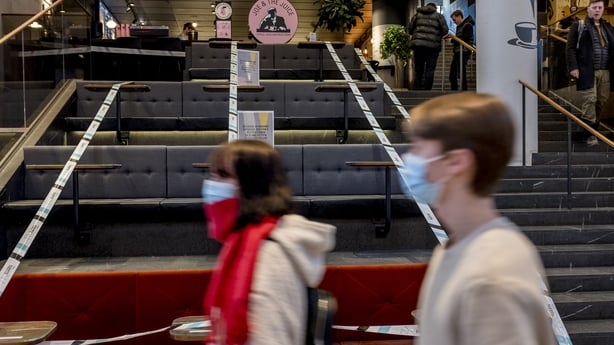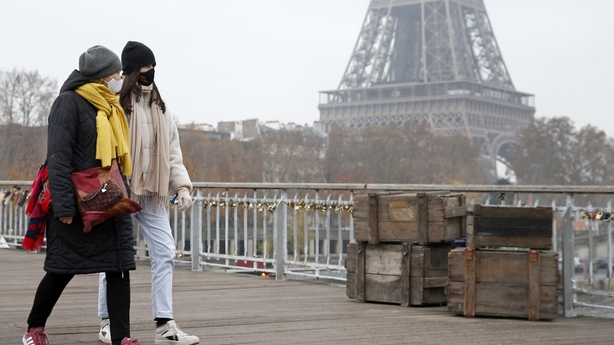Armed riot police in southern China have paraded four alleged violators of Covid rules through the streets, leading to criticism of the government's heavy-handed approach.
China banned such public shaming of criminal suspects in 2010 after decades of campaigning by human rights activists, but the practice has resurfaced as local governments struggle to enforce the national zero-Covid policy.
Four masked suspects in hazmat suits - carrying placards displaying their photos and names - were paraded yesterday in front of a large crowd in Guangxi region's Jingxi city, state-run Guangxi News said.
Photos of the event showed each suspect held by two police officers - wearing face shields, masks and hazmat suits - and surrounded by a circle of police in riot gear, some holding guns.
The four were accused of transporting illegal migrants while China's borders remain largely closed due to the pandemic, the newspaper said.
Jingxi is near the Chinese border with Vietnam.
The public shaming was part of disciplinary measures announced by the local government in August to punish those breaking health rules.
Guangxi News said the parade provided a "real-life warning" to the public, and "deterred border-related crimes".
But it also led to a backlash, with official outlets and social media users criticising the heavy-handed approach.
Although Jingxi is "under tremendous pressure" to prevent imported coronavirus cases, "the measure seriously violates the spirit of the rule of law and cannot be allowed to happen again," Chinese Communist Party-affiliated Beijing News said today.
Other suspects accused of illicit smuggling and human trafficking have also been paraded in recent months, according to reports on the Jingxi government website.
Videos of a similar parade in November showed a crowd of people watching two prisoners being held while a local official read out their crimes on a microphone.
They were then seen marching through the streets in their hazmat suits, flanked by police in riot gear.
And in August, dozens of armed police were seen marching a suspect through the streets to a children's playground.
WHO warns of 'very high' Omicron risk as Covid surges worldwide

Omicron still poses "very high" risk and could overwhelm healthcare systems, the WHO warned, as the highly transmissible coronavirus variant fuelled record outbreaks in many countries.
Case numbers have shot up 11% globally in the last week, forcing governments from China to Germany and France to find a difficult balance between anti-virus restrictions and the need to keep economies and societies open.
The Netherlands and Switzerland said Omicron had become the dominant strain in their countries, and while some studies suggested it causes milder Covid-19, the World Health Organization urged caution.
"The overall risk related to the new variant of concern Omicron remains very high," the UN health agency said in its Covid-19 weekly epidemiological update.
"Consistent evidence shows that the Omicron variant has a growth advantage over the Delta variant with a doubling time of two to three days."
The WHO said early data from Britain, South Africa, and Denmark - which currently has the world's highest rate of infection per person - suggested there was a reduced risk of hospitalisation for Omicron compared with Delta.
But it added that further data was needed to understand Omicron's severity.
And despite those studies, Omicron's rapid growth "will still result in large numbers of hospitalisations, particularly amongst unvaccinated groups, and cause widespread disruption to health systems and other critical services", warned WHO Europe's Covid Incident Manager Catherine Smallwood.
Europe was again one of the hotspots for the pandemic, which is known to have claimed more than 5.4 million lives around the world.
France, Britain, Greece and Portugal all reported record daily case numbers yesterday. France reported almost 180,000 infections over 24 hours.
To hold back the tide, many nations on the continent have brought back curbs with heavy economic and social consequences.
Contact restrictions were in place in Germany for the second year in a row heading into the New Year, as Europe's biggest economy shut nightclubs and forced sports competitions behind closed doors.
It also limited private gatherings to 10 vaccinated people - or two households where any unvaccinated people are present.
Finland yesterday said it would bar unvaccinated foreign travellers from entering. Only residents, essential workers or diplomats will be exempt.
The Nordic country, like Sweden, had begun requiring negative tests for incoming non-resident travellers from yesterday, a day after Denmark applied the same measure.

But the Belgian government's plans to introduce further restrictions were thwarted as a court suspended an order closing entertainment venues.
Prime Minister Alexander De Croo had announced the original measure on 22 December as Belgium saw a sharp increase in the percentage of tests showing the Omicron variant.
The Covid spikes around the world have caused severe disruptions to travel over the holidays, with thousands of flights cancelled worldwide.
They are also threatening sports events again.
England's top football league is grappling with record cases, while China has imposed strict lockdowns on millions of people to control the spread of the Delta variant ahead of the Beijing Winter Olympics.
Mexico City's mayor cancelled the capital's massive New Year's Eve celebrations as a preventative measure after a rise in Covid-19 cases.
The top American sports leagues have also been hit, as the United States battles a surge fuelled by Omicron, as well as large pockets of unvaccinated people and a lack of access to quick and easy testing.
The US Centers for Disease Control has halved the isolation period for asymptomatic cases to try to limit disruptions and mass labour shortages.
President Joe Biden said the United States was generally well prepared, though some hospitals could be "overrun".
As New Yorkers marked "Good Riddance Day" at Times Square - burning pieces of paper representing their worst memories of 2021 - many just wanted to say goodbye to Covid-19.
"I want to get rid of Covid and quarantines," said teacher Robin Myers yesterday.
"So that my kids can be normal again and see their friends and be out and be social."
Spain will also shorten the mandatory isolation period for people who test positive for Covid-19 from 10 to seven days, the health ministry said on Wednesday.
Earlier on Wednesday, Prime Minister Pedro Sanchez said the country needed to strike "a balance" between public health, mental health and economic growth.
Spain on Tuesday confirmed a record 99,671 new infections in the last 24 hours, bringing the 14-day infection rate to 1,360 cases per 100,000 residents, nearly twice the level from a week earlier.
France extends nightclub closures as Covid cases surge

French nightclubs will remain closed for a further three weeks, after nearly 180,000 new Covid cases smashed the record for daily cases since the pandemic began.
The roughly 1,600 clubs were ordered shut on 6 December for four weeks as officials hoped to avoid a wave of infections prompted by holiday travel and festivities, fuelled by the highly infectious Omicron variant.
But yesterday, France's health agency said 179,807 Covid cases had been reported over the previous 24 hours, far beyond the previous record of 100,000 reported on Saturday.
Tourism Minister Jean-Baptiste Lemoyne told France Inter radio that the decision to extend nightclubs closures was part of a series of new measures announced by the government this week in a bid to halt the Omicron spread.
"I can imagine the distress for these employees and entrepreneurs," he said. Financial aid would be provided for the huge loss of holiday business, he added.
Interior Minister Gerald Darmanin this week encouraged local officials to limit public New Year's Eve gatherings, in particular by requiring face masks outdoors and stepping up police patrols to enforce a ban on public alcohol consumption for the night.
Parliament will start debating today a new law to require a "vaccine pass" for entering restaurants, cinemas, museums and other public venues in a bid to spur further Covid jabs.
France already has one of the highest vaccination rates in the world, at 90% of the eligible population.
Music banned in bars and restaurants in Greece
Greece has banned music in bars and restaurants in a bid to limit New Year's Eve parties as part of new measures to stem the spread of the coronavirus.
"Omicron is now the dominant strain and the public health system is under pressure," Health Minister Thanos Plevris said in a televised address.
From Thursday and until 16 January, "restaurants and entertainment venues will only be able to host tables of six people and music will be banned," he said.
"Bars and restaurants will close at midnight, but will be authorised to stay open until 2 am on 31 December - still without music," he added.
Greece has been forced to implement the measures earlier than expected after the country on Tuesday announced a new record of 21,657 daily Covid-19 infections.
As part of the new restrictions, initially planned for 3 January, 50% of employees in the public and private sectors should work from home, up from 20% previously.
Catering staff and people who want to go grocery shopping or take public transport must wear either a FFP2 face mask or two medical masks one on top of the other.
All public New Year's Eve events have been cancelled, and the minister urged Greeks to test for Covid before any necessary family gatherings.

